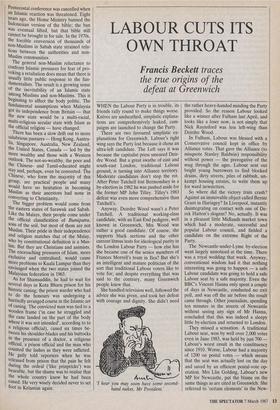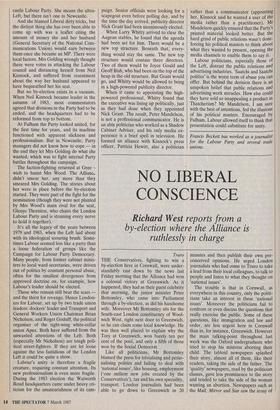LABOUR CUTS ITS OWN THROAT
Francis Beckett traces
the true origins of the defeat at Greenwich
WHEN the Labour Party is in trouble, its friends rally round to make things worse. Knives are unsheathed, simplistic explana- tions are comprehensively leaked, cam- paigns are launched to change the Party. There are two favoured simplistic ex- planations for Greenwich. Labour's right wing says the Party lost because it chose an ultra-left candidate. The Left says it was because the capitalist press smeared Deir- dre Wood. But a great swathe of east and south-east London, traditional Labour ground, is turning into Alliance territory. Moderate candidates don't stop the rot. After Peter Tatchell lost Bermondsey in a by-election in 1982 he was pushed aside for the former MP John Tilley. Tilley's 1983 defeat was even more comprehensive than Tatchell's.
Anyway, Deirdre Wood wasn't a Peter Tatchell. A traditional working-class candidate, with an East End pedigree, well known in Greenwich, Mrs Wood was rather a good candidate. Of course, she supports black sections and the other current litmus tests for ideological purity in the London Labour Party — how else has she became one of the senior members of Frances Morrell's team in Ilea? But she's an intelligent and mature politician of the sort that traditional Labour voters like to vote for; and despite everything that was said to the contrary, many Greenwich people knew that.
She handled television well, followed the advice she was given, and took her defeat with courage and dignity. She didn't need `I hear you may soon have some second- hand nukes, Mr President.' the rather heavy-handed minding the Party provided. So the reason Labour looked like a winner after Fulham last April, and looks like a loser now, is not simply that Nick Raynsford was less left-wing than Deirdre Wood.
In Fulham, Labour was blessed with a Conservative council kept in office by Alliance votes. That gave the Alliance (to misquote Stanley Baldwin) responsibility without power — the prerogative of the mug through the ages. Labour sent out bright young burrowers to find blocked drains, dirty streets, piles of rubbish, un- kempt housing estates, to write them up for ward newsletters.
So where did the victory train crash? Against an immovable object called Bernie Grant in Haringey? In Liverpool, instantly disintegrating on contact with one of De- rek Hatton's slogans? No, actually. It was in a pleasant little Midlands market town which had a moderate, successful and popular Labour council, and fielded a candidate on the extreme Right of the Party.
The Newcastle-under-Lyme by-election went largely unnoticed at the time. There was a royal wedding that week. Anyway, conventional wisdom had it that nothing interesting was going to happen — a safe Labour candidate was going to hold a safe Labour seat by a safe majority. Even the BBC's Vincent Hanna only spent a couple of days in Newcastle, conducted no exit poll, and was off the air before the result came through. Other journalists, spending ten minutes in the streets of Newcastle without seeing any sign of Mr Hanna, concluded that this was indeed a sleepy little by-election and returned to London.
They missed a sensation. A traditional Labour seat, won by well over 2,000 votes even in June 1983, was held by just 700 - Labour's worst result in the constituency since 1910. Worse, Labour had a majority of 1200 on postal votes — which means that the seat was actually lost on the day and saved by an efficient postal-vote op- eration. Mrs Llin Golding, Labour's new MP for Newcastle, put the blame on the same things as are cited in Greenwich. She referred to 'certain elements' in the New- castle Labour Party. She means the ultra- Left, but there isn't one in Newcastle.
And she blamed Liberal dirty tricks, but the dirtiest thing she has ever been able to come up with was a leaflet citing the amount of money she and her husband (General Secretary of the National Com- munications Union) would earn between them once she became an MP. There were local factors. Mrs Golding wrongly thought there were votes in attacking the Labour council and distancing herself from Neil Kinnock, and suffered from resentment about the way her husband appeared to have bequeathed her his seat.
But no by-election exists in a vacuum. When Neil Kinnock became leader in the autumn of 1983, most commentators agreed that divisions in the Party had to be ended, and the headquarters had to be reformed from top to bottom.
At Fulham the Party looked united, for the first time for years, and its machine functioned with apparent slickness and professionalism. But in Newcastle, Party managers did not know how to cope — in the end they let Mrs Golding do what she wanted, which was to fight internal Party battles throughout the campaign.
The faction-fighting returned at Gree ‘- wich to haunt Mrs Wood. The Allianc, didn't smear her, any more than they smeared Mrs Golding. The stories about her were in place before the by-election started. They were part of the fight for the nomination (though they were not planted by Mrs Wood's main rival for the seat, Glenys Thornton, who chairs the London Labour Party and is straining every nerve to hold it together).
It's all the legacy of the years between 1979 and 1983, when the Left laid about with its ideological scouring brush. Some- times Labour seemed less like a party than a loose federation of groups like the Campaign for Labour Party Democracy. Many people, from former cabinet minis- ters to local ward secretaries, were driven out of politics by constant personal abuse, often for the smallest divergences from approved doctrine on, for example, how Labour's leader should be elected.
Those who remain still bear the scars and the thirst for revenge. Hence London- ers for Labour, set up by two trade union leaders: dockers' leader and Transport and General Workers Union Chairman Brian Nicholson, and Roger Godsiff, the political organiser of the right-wing white-collar union Apex. Both have suffered from the unwanted attentions of the Left. Both (especially Mr Nicholson) are tough poli- tical street-fighters. If they are let loose against the less fastidious of the London Left it could be quite a show.
Labour's unity is therefore a fragile creature, requiring constant attention. Its new professionalism is even more fragile. During the 1983 election the Walworth Road headquarters came under heavy cri- ticism for the amateurishness of its cam- paign. Senior officials were looking for a scapegoat even before polling day, and by the time the day arrived, publicity director Nick Grant had been unanimously elected.
When Larry Whitty arrived to clear the Augean stables, he found that the agenda had been set for him. There would be a new top structure. Beneath that, every- thing would stay the same. The new top structure would contain three directors. Two of them would be Joyce Gould and Geoff Bish, who had been on the top of the heap in the old structure. But Grant would go, and Whitty would be allowed to bring in a high-powered publicity director.
When it came to appointing the high- powered professional, Whitty found that the executive was lining up politically, just as they had done when they appointed Nick Grant. The result, Peter Mandelson, is not a professional communicator. He is an able politician who worked as a Shadow Cabinet Adviser, and his only media ex- perience is a brief spell in television. He formed an alliance with Kinnock's press officer, Patricia Hewitt, alsd a politician rather than a communicator (appointing her, Kinnock said he wanted a user of the media rather than a practitioner). Mr Mandelson quickly ensured that the Party's printed material looked better. But the hard grind of public relations wasn't done: forcing his political masters to think about what they wanted to present, opening the media channels to enable them to say it. Labour politicians, especially those of the Left, distrust the public relations and advertising industries. 'Saatchi and Saatchi politics' is the worst term of abuse you can offer. But behind the derision there is an unspoken belief that public relations and advertising work miracles. How else could they have sold so unappealing a product as Thatcherism? Mr Mandelson, I am sure with the best of intentions, fed the illusions of his political masters. Encouraged by Fulham, Labour allowed itself to think that presentation could substitute for unity.
Francis Beckett has worked as a journalist for the Labour Party and several trade unions.



























































 Previous page
Previous page